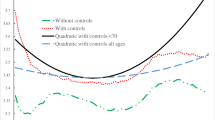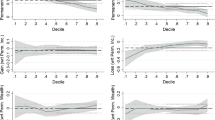Abstract
This paper examines the consequences of China’s dramatic socioeconomic and political transformations for individual subjective well-being (SWB) from 1990 to 2007. Although many still consider China to be a collectivist country, and some scholars have argued that collectivist factors would be important predictors of individual well-being in such a context, our analysis demonstrates that the Chinese are increasingly prioritizing individualist factors in assessments of their own happiness and life satisfaction thus substantiating descriptions of their society as increasingly individualistic. While the vast majority of quality of life studies have focused on Westerners, this study contributes findings from the unique cultural context of China. Moreover, concentration on this particular period in Chinese history offers insight into the relationship between SWB and rapid socioeconomic and political change.

Similar content being viewed by others
Notes
In addition, when income and support for collectivism were excluded from the models, which yielded a much larger analytic sample of size n = 2,071, none of the substantive findings for the other variables in the models differed.
We were unable to include an educational attainment measure due to the absence of a consistent and meaningful measure across waves of the WVS. The only measure of education that was included in all waves of the WVS in China was the age at completion of education, which is not particularly meaningful. Moreover, when this variable, which has considerable missingness, was included in the models presented in this paper, it did not alter any of the substantive conclusions presented.
When these three items are included in the models separately, the results do not differ substantively from those reported in this paper.
References
Brockmann, H., Delhey, J., Welzel, C., & Yuan, H. (2009). The China puzzle: Falling happiness in a rising economy. Journal of Happiness Studies, 10(4), 387–405.
Cheung, C. K., & Leung, K. K. (2007). Enhancing life satisfaction by government accountability in China. Social Indicators Research, 82(3), 411–432.
Di Tella, R., & MacCulloch, R. (2005). Partisan social happiness. The Review of Economic Studies, 72(2), 367–393.
Diener, E., Diener, M., & Diener, C. (1995). Factors predicting the subjective well-being of nations. Journal of Personality and Social Psychology, 69(5), 851–864.
Easterlin, R. A. (1995). Will raising the incomes of all increase the happiness of all? Journal of Economic Behavior and Organization, 27(1), 35–47.
Gries, P. H. (2004). China’s new nationalism: Pride, politics, and diplomacy. Berkeley, CA: University of California Press.
Gustafsson, B., Shi, L., & Sicular, T. (Eds.). (2008). Inequality and Public Policy in China. New York: Cambridge University Press.
Hofstede, G. (1980). Culture’s consequences: International differences in work-related values. Beverly Hills, CA: Sage.
Huang, Y. (2008). Capitalism with Chinese characteristics: Entrepreneurship and the state. New York: Cambridge University Press.
Hughes, C. R. (2006). Chinese nationalism in the global era. openDemocracy.net. Retrieved from: http://www.opendemocracy.net/democracy-china/nationalism_3456.jsp.
Hung, H. (2008). Rise of China and the global overaccumulation crisis. Review of International Political Economy, 15(2), 149–179.
Inglehart, R., Foa, R., Peterson, C., & Welzel, C. (2008). Development, freedom, and rising happiness: A global perspective (1981–2007). Perspectives on Psychological Science, 3(4), 264–285.
Jagodzinski, W. (2010). Economic, social, and cultural determinants of life satisfaction: Are there differences between Asia and Europe? Social Indicators Research, 97(1), 85–104.
Lu, L., & Gilmour, R. (2004). Culture and conceptions of happiness: Individual oriented and social oriented SWB. Journal of Happiness Studies, 5(3), 269–291.
Michailova, S., & Hutchings, K. (2006). National cultural influences on knowledge sharing: A comparison of China and Russia. Journal of Management Studies, 43(3), 383–405.
Moore, R. L. (2005). Generation Ku: Individualism and China’s millennial youth. Ethnology, 44(4), 357–376.
Napier, J. L., & Jost, J. T. (2008). Why are conservatives happier than liberals? Psychological Science, 19(6), 565–572.
Ong, A. (1997). ‘A momentary glow of fraternity’: Narratives of Chinese nationalism and capitalism. Identities: Global Studies in Culture and Power, 3(3), 331–366.
Shek, D. T. L. (2010). Introduction: Quality of life of Chinese people in a changing world. Social Indicators Research, 95(3), 357–361.
Stevenson, B., & Wolfers, J. (2008). Economic growth and happiness: Reassessing the easterlin paradox. Washington, DC: Brookings Institution.
United Nations Development Programme. (2010). HDI Trends. In Human Development Reports, vol. 2010: United Nations Development Programme (UNDP).
Van Hoorn, A. (2007). A Short Introduction to Subjective Well-Being: Its Measurement, Correlates and Policy Uses. In Is happiness measurable and what do those measures mean for policy?, edited by Bank of Italy, the Centre for Economic & International Studies (CEIS), the Joint Research Centre of the European Commission and the Organisation for Economic Cooperation and Development (OECD). University of Rome, Italy.
Wang, X. (2002). The post-communist personality: The spectre of China’s capitalist market reforms. The China Journal, 47, 1–17.
Whyte, M. K. (2010). Fair versus unfair: How do Chinese citizens view current inequalities? Growing pains: Tensions and opportunity in China’s transformation. Stanford: Shorenstein Center.
Xu, L., Wang, Y., Collins, C., & Tang, S. (2007). Urban health insurance reform and coverage in China using data from National Health Services Surveys in 1998 and 2003. BMC Health Services Research, 7, 37–51.
Yan, Y. (2010). The Chinese path to individualization. The British Journal of Sociology, 61(3), 489–512.
Zhao, S. (1998). A state-led nationalism: The patriotic education campaign in post-Tiananmen China. Communist and Post-Communist Studies, 31(3), 287–302.
Zhao, S. (2005). China’s pragmatic nationalism: Is it manageable? The Washington Quarterly, 29(1), 131–144.
Acknowledgments
The authors would like to thank Martin Ruef and Gilbert Rozman for providing invaluable comments on early drafts of this paper. We are also grateful for the constructive suggestions from the SIR editor and anonymous reviewers. The content is solely the responsibility of the authors.
Author information
Authors and Affiliations
Corresponding author
Rights and permissions
About this article
Cite this article
Steele, L.G., Lynch, S.M. The Pursuit of Happiness in China: Individualism, Collectivism, and Subjective Well-Being During China’s Economic and Social Transformation. Soc Indic Res 114, 441–451 (2013). https://doi.org/10.1007/s11205-012-0154-1
Accepted:
Published:
Issue Date:
DOI: https://doi.org/10.1007/s11205-012-0154-1




